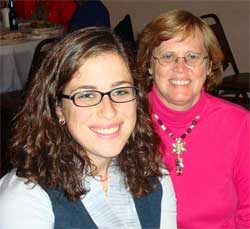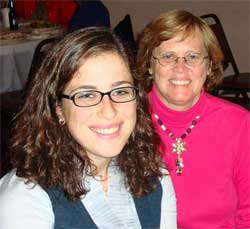 KINGSTON, R.I. –January 20, 2010—Until last November, the state of Rhode Island had the dubious distinction of not having laws against prostitution or forced labor trafficking. As a result, the state has never prosecuted a human trafficking case, nor has there ever been a federal prosecution of a sex trafficking case in Rhode Island. Because the state didn’t have a law against prostitution that would enable state and local police to cooperate with the FBI, the Ocean State was excluded from the Innocence Lost National Initiative. Since 2003, that initiative has helped rescue nearly 900 children and convict 510 pimps.
KINGSTON, R.I. –January 20, 2010—Until last November, the state of Rhode Island had the dubious distinction of not having laws against prostitution or forced labor trafficking. As a result, the state has never prosecuted a human trafficking case, nor has there ever been a federal prosecution of a sex trafficking case in Rhode Island. Because the state didn’t have a law against prostitution that would enable state and local police to cooperate with the FBI, the Ocean State was excluded from the Innocence Lost National Initiative. Since 2003, that initiative has helped rescue nearly 900 children and convict 510 pimps.
In 1980, the Rhode Island General Assembly passed a law that decriminalized prostitution. A law banning loitering for indecent purposes kept soliciting for prostitution illegal outdoors, but there were no laws or regulations on prostitution conducted indoors. Perennial legislative attempts to pass a law against prostitution failed until this year when three pieces of legislation passed despite vigorous opposition by people who argued for the status quo either because the law would unfairly target victims of sex trafficking (it doesn’t) or because it provided jobs during a flagging economy and gave drug addicted women a way to earn money.
When Gov. Donald Carcieri signed the legislation on Nov. 3, he acknowledged the work of University of Rhode Island Women’s Studies Professor Donna Hughes, an internationally recognized researcher on the trafficking of women and children, and her former student and protégé Melanie Shapiro. Both provided expert testimony before the state’s General Assembly and rallied national support, co-founding Citizens Against Trafficking–citizensagainsttrafficking.org—to advocate for the bills’ passage.
The bills, sponsored by Rep. Joanne Giannini of Providence, protect victims from sex industry predators and give law enforcement the ability to arrest traffickers. The law bans minors from working in any adult entertainment business, criminalizes forced labor as a form of human trafficking, and enables prosecution of sex trafficking of minors without proving that coercion was used. The law also criminalizes the soliciting of sex by prostitutes and johns. To protect victims of sex trafficking the law prohibits them from being convicted of prostitution offenses.
“Melanie gave critical research support for the three laws that passed,” said Hughes, who is frequently consulted by governments and non-governmental organizations on policy related to women’s human rights, particularly on trafficking of women and girls for sexual exploitation.
Shapiro became aware of sex trafficking issues after watching Day My God Died, a documentary about child prostitution in India and a New York Times article by Pete Landesman about trafficking of Mexican girls in a city about three miles from where she grew up in Watchung, N.J. “The article showed me that sex trafficking was occurring right here in the U.S. and really brought the issue home for me,” she says.
When she came to URI she took classes with Hughes, who encouraged her to keep reading about the issues. Her thoroughly researched senior honors thesis, which provided in-depth information about sex trafficking in Rhode Island, was widely distributed. She also wrote reports, helped keep the issue in the media, and kept track of the brothel business during the campaign to change the law.
“I learned to trust my instincts, and never let my focus be derailed by detractors, not when peoples’ lives are at stake,” said Shapiro who graduated summa cum laude from URI last May. “The campaign was draining, difficult, and politically challenging, but watching the signing made it all worth it. I remember tearing up in the Statehouse. Rep. Giannini worked so hard for something she, Donna, and I believed in. Justice came alive before us.”
The URI alumna is now a Bristol resident attending Roger Williams University School of Law with the goal of ultimately becoming a federal prosecutor and prosecuting trafficking cases.
“Finally, after a long process of drafting bills and negotiating, we have a prostitution bill that I think is one of the best of the country,” says Hughes. “Adding the three new laws to the existing human trafficking and anti-pimping laws gives Rhode Island one of the most comprehensive set of laws preventing the commercial sexual exploitation of women and children in the U.S. I hope they will be put to good use.”
The new legislation had an immediate impact on some of the 30 suspected brothels operating across the state. State Police announced their first arrests within weeks of its passage. Several clubs eliminated their “VIP rooms,” which were used for prostitution, and signs went up notifying patrons that prostitution is illegal.
“Recently, the Rhode Island U.S. Attorney’s Office announced the arrest of a couple who trafficked a woman into the state and forced her into prostitution. Prior to the passage of the prostitution law, this arrest could not have been made,” Hughes says.
Pictured above
URI 2009 alumna Melanie Shapiro (left) and URI Women’s Studies Professor Donna Hughes. Photo courtesy of Melanie Shapiro.

